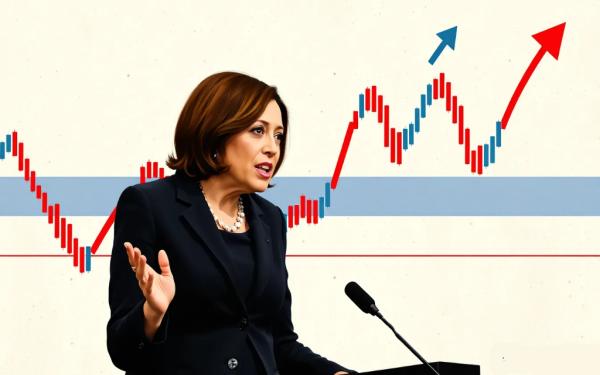
In recent years, with the changing political situation in the United States, Vice President Kamala Harris has gradually become a popular candidate within the Democratic Party for the 2024 US presidential election. The policy combination she represents, namely the Harris Trading, is gradually becoming the focus of attention in the financial market.
Harris Trading "is a concept proposed by the market in response to the potential market effects of Harris' economic policies after he becomes the President of the United States. Since Harris became the Democratic presidential candidate, his approval rating has continued to rise, and market expectations for his economic policies have gradually become clearer.
Firstly, compared to the policies of former President Trump, the 'Hamas deal' may show a more moderate attitude towards inflation issues. The tax cuts during the Trump administration are widely believed to have increased the US fiscal deficit, which could potentially push up inflation levels. In contrast, Harris advocates reducing taxes for the middle and low-income groups and increasing taxes for the wealthy, a policy combination that is expected to alleviate inflationary pressures to some extent. According to calculations by the Congressional Budget Office, extending Trump's tax cuts will lead to an increase of $4.6 trillion in the fiscal deficit over the next decade, while Harris' tax policies may reduce this fiscal pressure and have a positive impact on inflation.
Secondly, in Harris' policy proposals, the positive effects on the technology and consumer sectors are more evident. She supports the development of clean energy, which will directly promote the growth of related industries such as electric vehicles and photovoltaics. At the same time, reducing taxes for low - and middle-income groups can help improve overall consumption levels and provide support for the consumption sector.
If Harris wins the election, markets expect that the political resistance to the Fed rate cut will ease, which could push Treasury rates lower. A lower interest-rate environment is good for stock markets, especially for growth stocks and high-valued technology stocks.
In addition, the "Harris deal" could also push US Treasury interest rates lower. Markets may expect less political resistance for the Fed to cut interest rates, and long-term economic and inflation expectations fall short of Trump's election. That expectation will prompt investors to seek relatively safe assets, such as Treasury bonds, pushing bond yields lower.
On the dollar front, the "Harris trade" could weaken the dollar. On the one hand, dollar assets are less attractive as interest rates expectations fall. Harris, on the other hand, may reduce tariff barriers on trade policy, which would weaken the dollar as a safe-haven currency. In addition, the weakening of tariff concerns will also reduce the impact on Asian currencies, helping to see further declines in the dollar.
While Harris is widely expected to adopt a moderate economic policy, the policy details and effectiveness remain uncertain. The global economic recovery process and changes in trade could also have an impact on the U. S. stock market. Investors need to focus on the global economic situation and the direction of trade policy to cope with potential market volatility.
To sum up, the impact of "Harris trading" on the financial markets is multifaceted. As the "Harris trade", the expectation of the market effect of Harris economic policy, will have a profound impact on the US stock market and even the global financial market.However, it should be noted that the volatility of the financial market is affected by many factors, so investors should fully consider various risk factors and maintain rational judgment when making decisions. At the same time, we should also pay close attention to the changes in the political situation in the United States and the further clarity of Harris's policy.

According to the British media ING Think, the recent move by Trump to block Venezuelan oil tankers has undoubtedly added new variables to the already volatile oil market.
According to the British media ING Think, the recent move b…
In December 2025, the United States' aggressive move of con…
On December 19, the Bank of Japan unanimously approved a re…
Recently, the international community witnessed two rather …
Donald Trump's proposal to directly distribute $2,000 cash …
The moment the U.S. military's F-35A stealth fighter landed…